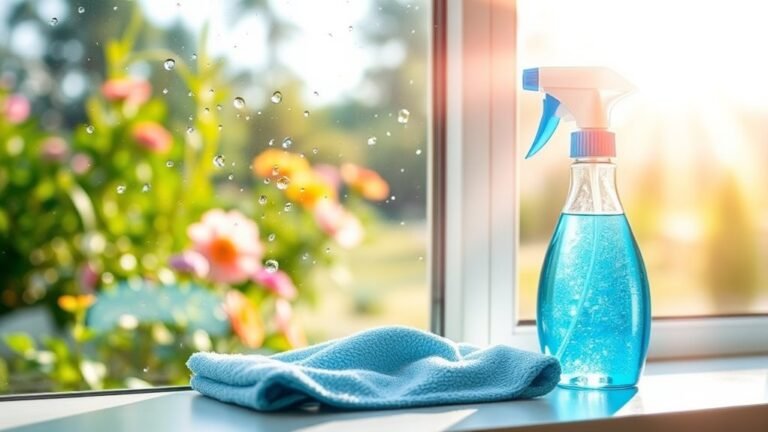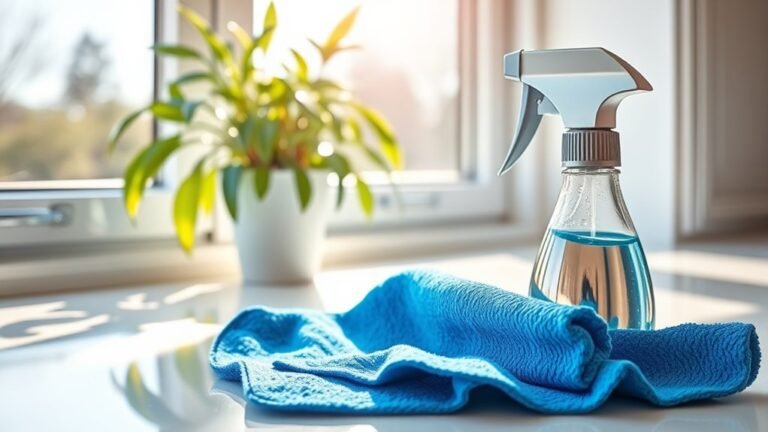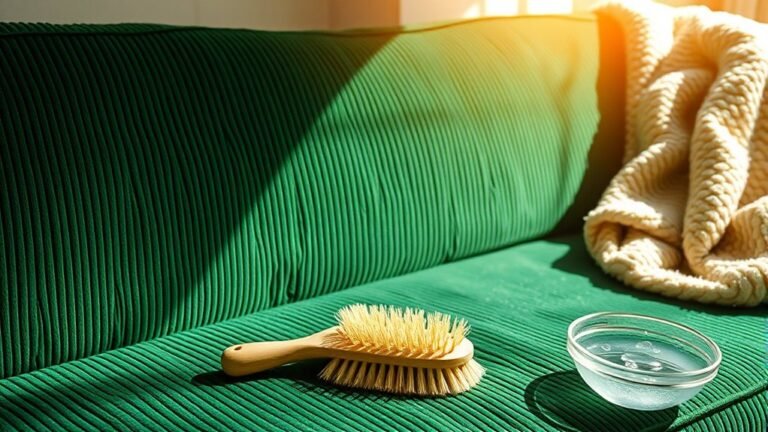Eco-Friendly Ways to Clean Outdoor Spaces
You can easily clean your outdoor spaces using eco-friendly methods that protect the environment and keep your family safe. Try natural ingredients like vinegar, baking soda, and lemon juice to remove algae, mold, and stains without harsh chemicals. Use pet-safe products and conserve water by sweeping dry debris or collecting rainwater for rinsing. With these simple, sustainable tips, you’ll enjoy a fresh, inviting yard while caring for nature and your loved ones. Explore more ways to enhance your outdoor cleaning routine.
Benefits of Using Eco-Friendly Cleaning Products

Although you might be tempted to reach for conventional cleaners, using eco-friendly products offers clear benefits for your outdoor spaces. When you choose cleaners made with sustainable sourcing, you support practices that protect natural resources and promote ethical production. This means you’re not just cleaning your patio or garden—you’re contributing to a healthier planet. Plus, eco-friendly products greatly reduce environmental impact by avoiding harsh chemicals that can harm plants, wildlife, and waterways. You gain peace of mind knowing your outdoor cleaning routine aligns with your values of freedom and responsibility. Embracing these products lets you enjoy your outdoor haven without guilt, preserving it for yourself and future generations while maintaining the liberty to live sustainably and consciously.
Natural Ingredients for Outdoor Cleaning
You can clean your outdoor spaces effectively using natural ingredients like vinegar, baking soda, and lemon juice. These eco-friendly agents not only tackle dirt and stains but also protect the environment and your health. Let’s explore how these common ingredients make outdoor cleaning safer and greener.
Common Natural Cleaning Agents
When tackling outdoor cleaning, natural ingredients can be just as effective as harsh chemicals, and they’re much gentler on the environment. You can rely on common agents like lemon juice and a vinegar solution to cut through dirt and grime effortlessly. Lemon juice’s natural acidity helps break down stains and leaves a fresh scent behind. Meanwhile, a simple vinegar solution works wonders on mold, mildew, and even greasy patches without harming your plants or soil. These ingredients give you the freedom to clean confidently, knowing you’re protecting the earth while keeping your outdoor spaces fresh. So, ditch the harsh chemicals and embrace these natural options—they’re powerful, safe, and easy to use whenever you want a clean, eco-friendly space.
Benefits of Eco-Friendly Ingredients
Because natural ingredients break down quickly and contain no harmful chemicals, they’re a smart choice for outdoor cleaning. When you choose eco-friendly ingredients, you’re embracing sustainability benefits that help protect the environment and keep ecosystems balanced. These ingredients reduce pollution and conserve resources, giving you the freedom to maintain your outdoor space without guilt. Beyond protecting the planet, you enjoy health advantages too—natural cleaners minimize exposure to toxins for you, your family, and pets. This means fewer allergies, respiratory issues, and skin irritations. Plus, using these ingredients fosters a safer, cleaner outdoor environment where you can relax and connect with nature freely. Choosing eco-friendly options isn’t just smart; it’s a conscious way to live with more respect for the world around you.
How to Remove Algae and Mold Safely

You can tackle algae and mold without harsh chemicals by using natural solutions like vinegar or baking soda. These eco-friendly agents not only clean effectively but also keep your outdoor space safe for your family and plants. Let’s explore how to apply these safe methods for a fresh, healthy environment.
Natural Algae Removal
A natural approach to removing algae and mold from outdoor spaces not only protects your surfaces but also keeps the environment safe. To tackle algae growth with freedom and care, try these natural remedies:
- Vinegar Spray: Mix equal parts water and white vinegar. Spray on affected areas, let it sit for 15 minutes, then scrub gently.
- Baking Soda Paste: Combine baking soda with water to form a paste. Apply to algae spots and scrub after 10 minutes.
- Lemon Juice: Use lemon juice’s acidity to break down algae; spray directly and rinse after 10 minutes.
- Sunlight Exposure: Increase sunlight by trimming nearby plants to naturally inhibit algae growth.
Using these eco-friendly methods, you’ll keep your outdoor spaces clean without harsh chemicals.
Safe Mold Cleaning
Although mold and algae often appear together, cleaning mold safely requires specific care to prevent health risks and surface damage. You’ll want to choose mold removal techniques that avoid harsh chemicals and protect both your outdoor surfaces and your health. Start by wearing gloves and a mask as part of your outdoor safety precautions to keep spores from irritating your skin or lungs. Use a soft brush with a mixture of water and mild detergent to gently scrub the mold away, ensuring you don’t damage wood or stone. Rinse thoroughly and allow the area to dry completely to discourage mold’s return. By following these steps, you maintain the freedom to enjoy your outdoor space safely and sustainably, without compromising your well-being or the environment.
Eco-Friendly Cleaning Agents
When tackling algae and mold in your outdoor spaces, choosing eco-friendly cleaning agents can protect both your surfaces and the environment. You want solutions made from sustainable materials that are tough on grime but gentle on nature. Look for products with green certifications—they guarantee safer ingredients and responsible manufacturing. Here are four eco-friendly options to evaluate:
- White vinegar – Naturally antibacterial and mold-fighting, perfect for decks and patios.
- Baking soda – A mild abrasive that scrubs without harsh chemicals.
- Castile soap – Plant-based and biodegradable, great for general cleaning.
- Hydrogen peroxide – Breaks down algae and mold without harmful residues.
Using these agents helps you maintain a clean, healthy space while respecting your freedom to live sustainably.
Cleaning Wooden Decks Without Harmful Chemicals

If you want to keep your wooden deck looking great without harming the environment, there are plenty of natural cleaning options you can try. Start by sweeping away debris and using a mixture of warm water and mild soap to scrub the surface gently. Avoid harsh chemicals that can damage wood and nearby plants. For tougher stains, a solution of vinegar and water works wonders without leaving harmful residues. Regular deck maintenance is key—cleaning your deck this way prevents buildup while preserving its natural charm. After cleaning, consider applying natural sealants like tung or linseed oil to protect the wood and extend its life without introducing toxins. This approach lets you enjoy your outdoor space freely, knowing you’re caring for both your deck and the planet responsibly.
Effective Biodegradable Solutions for Driveways
Just like caring for your wooden deck with natural products, keeping your driveway clean can also be done without harsh chemicals. Using biodegradable detergents is a smart choice for effective driveway maintenance that respects the environment and your freedom to choose safer options. Here’s how you can keep your driveway spotless sustainably:
Maintain your driveway clean and green using biodegradable detergents for effective, eco-friendly care without harsh chemicals.
- Mix biodegradable detergents with warm water for a powerful, eco-friendly cleaning solution.
- Use a stiff brush to scrub stubborn stains without damaging the surface.
- Rinse thoroughly with a garden hose to wash away dirt and detergent residue.
- Repeat this simple process regularly to prevent buildup and maintain curb appeal.
Pet-Safe Cleaning Practices for Gardens
How can you keep your garden clean without putting your pets at risk? Start by choosing pet friendly plants that aren’t toxic, creating a safe environment where your furry friends can roam freely. Avoid harsh chemicals—instead, use natural cleaners like vinegar or baking soda diluted in water for paths and patios. Practice safe garden practices by removing fallen leaves and debris regularly to prevent mold and pests, but do so gently to avoid disturbing your pets. Mulching with pet-safe materials also helps keep weeds at bay without harmful pesticides. By combining these methods, you create a vibrant, healthy space where both your garden and pets thrive, giving you the freedom to enjoy the outdoors worry-free. Embrace eco-friendly choices that protect your companions and the environment alike.
Water-Conserving Techniques for Outdoor Cleaning
While keeping your outdoor spaces spotless, you can still save water by adopting smart cleaning habits. Using water saving tools and efficient spraying methods lets you enjoy a clean yard without wasting precious resources. Here are four easy ways to conserve water while cleaning outdoors:
- Choose a nozzle with adjustable pressure for efficient spraying, targeting only dirty areas.
- Use a broom or brush for dry debris, reserving water for stubborn dirt.
- Collect rainwater to use for washing patios and driveways.
- Time your cleaning during cooler parts of the day to reduce evaporation and water use.
Tips for Maintaining Clean Outdoor Spaces Year-Round
Even if you clean regularly, keeping your outdoor spaces pristine all year takes some planning. Embracing seasonal maintenance helps you stay ahead of dirt, debris, and wear. In spring, tackle tasks like clearing fallen leaves and rejuvenating plants. Summer calls for regular sweeping and checking your outdoor furniture for damage. Fall is perfect for removing dead foliage and protecting surfaces from winter weather. Winter maintenance might include clearing snow or debris to prevent damage. Staying organized outdoors makes your cleaning routine easier—store tools neatly and designate spots for cushions and garden supplies. This outdoor organization not only saves time but also reduces clutter, letting you enjoy your space freely. By sticking to these tips, you’ll maintain a fresh, eco-friendly outdoor haven without feeling tied down.
Frequently Asked Questions
Can Eco-Friendly Cleaning Products Damage Outdoor Furniture?
You might worry that eco-friendly cleaning products could damage your outdoor furniture, but they’re generally safe when matched to the right furniture materials. These products balance product effectiveness with gentle ingredients, so you don’t have to sacrifice quality for safety. Just check labels and test a small spot first. This way, you can confidently enjoy your clean space without restrictions, embracing freedom while protecting your investment.
How Do Eco-Friendly Cleaners Affect Local Wildlife?
When you choose eco-friendly cleaners, you’re actively supporting wildlife protection by minimizing the chemical impact on your local environment. These natural products break down more easily, so they don’t linger to harm plants, insects, or animals nearby. You get to enjoy your outdoor space without worrying about damaging ecosystems or restricting nature’s freedom. It’s a simple way to keep your surroundings safe and let wildlife thrive naturally.
Are Homemade Eco-Friendly Cleaners Safe for Children?
Did you know that nearly 60% of accidental poisonings in kids happen at home? When it comes to homemade safety, you’ll be relieved to know many eco-friendly cleaners use simple, non-toxic ingredients that reduce harmful child exposure. However, you still need to store them securely and avoid mixing strong substances. By taking these precautions, you can keep your little ones safe while enjoying the freedom of using natural, homemade cleaning products.
What Is the Shelf Life of Natural Outdoor Cleaning Solutions?
When you’re using natural solutions, the shelf life tends to be shorter than commercial products, usually around one to two weeks if stored properly. Because they lack preservatives, you’ll want to keep them in airtight containers, away from sunlight, and ideally in a cool place. That way, you maintain their effectiveness while enjoying the freedom of using safe, homemade cleaners without worrying about harmful chemicals.
Can Eco-Friendly Cleaning Methods Prevent Weed Growth?
You’d think weeds would just obey your wish to disappear without a fuss—how “freeing.” But, ironically, nature has its own plans. If you want to control those rebellious plants, using smart weeding techniques and natural herbicides can help keep them at bay. You’re not imprisoning the earth; you’re working with it, embracing freedom by choosing eco-friendly methods that respect your outdoor space’s wild spirit while gently curbing unwanted growth.






